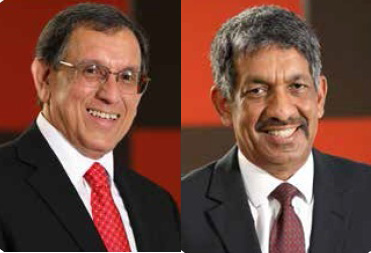Reply To:
Name - Reply Comment
 Chairman DFCC Bank - Mr. Royle Jansz & CEO DFCC - Mr. Arjun Fernando
Chairman DFCC Bank - Mr. Royle Jansz & CEO DFCC - Mr. Arjun Fernando
The financial year ended 31 December 2016 was the first full year of operations after the amalgamation of DFCC Bank with DFCC Vardhana Bank, which took place on 01 October 2015. The expectations were that the amalgamated Bank would reach new financial and other thresholds as a result of a successful blending of development banking and commercial banking coupled with significant synergies. This was borne out by the record results for the period where DFCC’s Profit after Tax (without extraordinary capital gains) crossed the LKR 3.0 billion mark for the first time in the Bank’s history.
It was a year in which DFCC excelled in several metrics such as financial performance, employee engagement and brand enhancement. The trends in key numbers are especially noteworthy. Total income grew 35% to reach LKR 26,754 million while proactive management of asset / liability pricing enabled a 25% growth in net interest income. This was aided by a successful drive to increase the current and savings base with innovative retail products, which diversified funding and stabilised interest margins. An increased focus on ancillary services, which included the Bancassurance arrangement with AIA, and introduction of unique digital banking delivery channels, like the Vardhana Wallet, helped achieve 14% growth in net fee and commission income. Effective use of market opportunities helped post a 56% growth in trading results from FOREX and Government securities while the net gain from financial investments amounted to LKR 1,165 million, the bulk coming from a dividend of LKR 712 million from DFCC’s shareholding of Commercial Bank of Ceylon. Overall, operating Income surpassed the LKR 11 billion mark to reach a new high of LKR 11,461 million.
Total assets grew by 18% with Loans and Advances increasing by LKR 25,439 million. DFCC maintained its strong presence in project lending with the bulk of loan growth coming from project loans, which increased by LKR 8,923 million followed by trade loans, which increased by LKR 5,984 million. Portfolio quality remained a priority and proactive monitoring enabled an improvement in key indicators. Despite a 16% net growth in the loan portfolio, non-performing advances were curtailed with impaired loans declining to 4.5% of total loans from 5.1%. Accordingly, the total impairment charge reduced by 7% to LKR 937 million compared to LKR 1,007 million. Particularly significant was the reduction in the non performing loan ratio to less than 3.0%, from 3.7%. This is creditable given the larger proportion of higher risk project loans in DFCC’s portfolio when compared to the industry.
Portfolio quality was also improved by recoveries from substantial ‘hard core’ debts following diligent remedial action. In terms of prudency, DFCC continued to maintain its position as one of the best capitalised banks in the industry. As at 31 December 2016, the Group Tier 1 capital adequacy ratio was 14.6% while the total capital adequacy ratio was 17.5%, both of which are well above the regulatory stipulated levels. These provide financial safety and the foundation for future growth. Meanwhile, DFCC’s National Rating was reaffirmed by Fitch Ratings Lanka Limited at AA- (lka).
Amalgamation synergies, monitoring of expenses and effective utilisation of resources also contributed to the bottom line with operating expenses recording a slight decline. Despite an additional head count and an increase in overhead expenses, net profit per employee rose by over 30% while at 45%, DFCC’s cost to income ratio remains one of the lowest in the industry. DFCC’s employees are its most valuable resource and to further their development, the Bank launched a human resource initiative under the innovative ‘Great Place to Work’ programme, which is facilitating the generation of new ideas as to how things should be done at DFCC. The end result is that the Bank’s new internal culture is one that enables employees to learn, innovate and embrace change.
In terms of the performance of DFCC Group, a consolidated Profit after Tax of LKR 3,469 million was recorded during the year ended 31December 2016. Apart from DFCC, major contributions were made by Acuity Partners, Lanka Industrial Estates and National Asset Management who posted Profits before Tax of LKR 299 million, LKR 111 million and LKR 39 million respectively in their individual financials. As for DFCC itself, the Bank’s operating profit (before value added, NBT and income tax) reached a new high of LKR 5,400 million, a growth of 51% over the previous year. The outcome was that the bottom line (without extraordinary capital gains) recorded a strong growth of 60% to reach LKR 3,289 million compared to LKR 2,053 million in the previous period. As such, it could be said that DFCC underwent a paradigm shift in 2016 in key financial and non financial metrics.